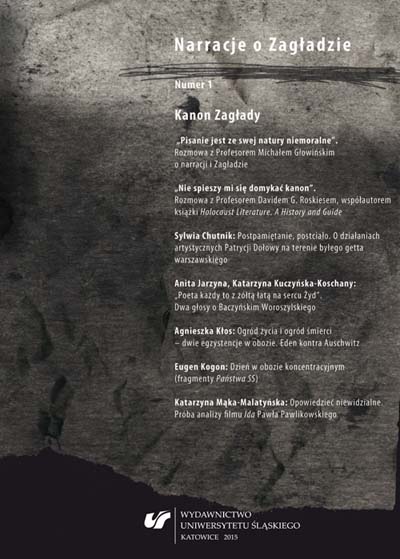Recenzje: Ziarnko do ziarnka? Agnieszka Kłos: "Gry w Birkenau". Wrocław, Fundacja na Rzecz Kultury i Edukacji im. Tymoteusza Karpowicza, 2015
Reviews: Take care of the pennies and the dollars will take care of themselves? Agnieszka Kłos: "Gry w Birkenau". Wrocław, Fundacja na Rzecz Kultury i Edukacji im. Tymoteusza Karpowicza, 2015
Author(s): Ewa GraczykSubject(s): Language and Literature Studies, Studies of Literature, History of the Holocaust, Book-Review
Published by: Wydawnictwo Uniwersytetu Śląskiego
Summary/Abstract: Ewa Graczyk’s text is above all an attempt at describing the narrative structure of the collection of stories by Agnieszka Kłos entitled "Gry w Birkenau". According to the author of the essay, the contemporary reflection about the Shoah and the accompanying awareness of the impossibility of closing the post-Holocaust space – both the literal and the semantic one – are ubiquitous in Agnieszka Kłos’s prose. In the writings by the author of "Gry"… there is a recurrence of a sort of a “narrative enjambment” which consists in the continuation of the particular themes and subjects by seemingly finished works. This device yields the effect of movement, falling apart and the intertexture of the tropes which are crucial for this prose. This aspect of Ewa Graczyk’s prose which is discussed is associated with the problem of the nomadic singularity of the narratrix/protagonist of the stories. This singularity has to do with the constant constitution (and frequently deconstruction) of the rebellious lesbian feminine subjectivity, which inquires after the power, sex and gender in the world after Birkenau. These tensions are exhibited in the text by juxtaposing "Gry w Birkenau" with the pre-Holocaust writings of Bruno Schulz and Debora Vogel. This juxtaposition enables us to see that Agnieszka Kłos’s stories seem to invoke both Schulzian confrontations of the Maker and the Creator with the work and the world as well as the literary experiments of Debora Vogel in which there is a seeming absence of the narratrix and the creatrix.
Journal: Narracje o Zagładzie
- Issue Year: 2015
- Issue No: 1
- Page Range: 298-303
- Page Count: 6
- Language: Polish

